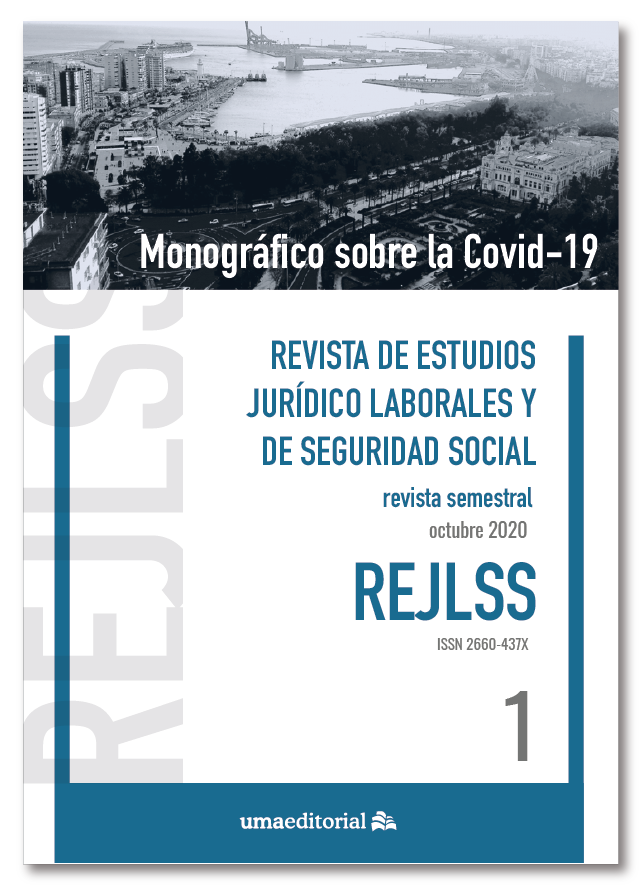The searched “prohibition of employment labor” in the time of COVID19:
“vices” of a “legality (administrative) without law”
DOI:
https://doi.org/10.24310/rejlss.vi1.10413Keywords:
prohibition of dismissal, labor laws, COVID19, judicial activism, null dismissalAbstract
In Spain, article 2 of Royal Decree-Law 2/2020, March 27, raises a serious legal interpretative problem. Although the Spanish Government seems to be seeking a prohibition against the dismissal of workers due to the crisis stemming from the covid19, in the legal text it is not at all clear that it is a dismissal with a prohibited cause and, therefore, would not entail the nullity of dismissal, but only severance pay (the cost of business arbitrariness). The first judicial cases have assumed that there is such a cause for annulment. However, the reasoning given to reach such a conflictive solution is extremely weak, technically not very rigorous, so it is highly likely that these decisions will be reversed by the higher judicial instances. In any case, the price of this defective legislation is the extreme increase in legal insecurity, in an increasingly stressed legal systemct.
Downloads
Metrics
Publication Facts
Reviewer profiles N/A
Author statements
Indexed in
-
—
- Academic society
- N/A
- Publisher
- Universidad de Málaga. UMA Editorial
References
BELTRÁN DE HEREDIA, I. “ERTE y fuerza mayor parcial: valoración crítica de los criterios interpretativos de la Dirección General de Trabajo”. https://ignasibeltran.com/2020/06/01/erte-y-fuerza-mayor-parcial-valoracion-critica-de-los-criterios-interpretativos-de-la-direccion-general-de-trabajo/
EWALD, F. “Le droit du travail: unelegalite sans droit”, Droit Social, 11, 1985 pp. 723 y ss.
BELTRÁN DE HEREDIA, I. La «prohibición» de despido del art. 2 RDLey 9/2020 no acarrea la nulidad (comentario crítico a la SJS/3 Sabadell 6/7/20), https://ignasibeltran.com/2020/07/22/la-prohibicion-de-despido-del-art-2-rdley-9-2020-no-acarrea-la-nulidad-comentario-critico-a-la-sjs-3-sabadell-6-7-20/.
FERRAJOLI, L. Derecho y garantías. La Ley del más débil, Editorial Trotta, Madrid, 2004, pp. 15 y ss.
GÓMEZ SALADO, M.A. “El Real Decreto-ley 4/2020, 18 de febrero: una medida laboral urgente para garantizar el cumplimiento de los compromisos europeos, la seguridad jurídica y la protección de los colectivos más vulnerables”, Revista de Trabajo y Seguridad Social, CEF, n. 446, 2020, pp. 79 y ss.
GORELI HERNÁNDEZ, J. El coste económico del despido o el coste de la arbitrariedad: un estudio sobre la eficacia del despido disciplinario ilícito, CARL, Sevilla, 2010; GIMENO DÍAZ DE ATAUR, P. el coste del despido y otras formas de terminación de trabajo por iniciativa empresarial: un análisis jurídico y económico, Lex Nova, Valladolid, 2014.
GRISOLÍA, Julio Armando. “las normas laborales como consecuencia del covid19”.http://revista-ideides.com/normas-laborales-en-la-emergencia-economica-y-como-consecuencia-del-covid-19-dnu-329-2020-bo-31-3-202020-dnu-332-2020-bo-1-4-2020-y-res-mtess-279-2020-bo-1-4-2020/.
MARTÍN GODINO, “Prohibir el despido no mejora el empleo”. En https://www.expansion.com/economia/2020/07/16/5f10a268468aeb0d1f8b457f.html.
MOLINA NAVARRETE, C. “Tormenta sociolaboral perfecta” y “encomiendas a santa Bárbara”: la Seguridad Social ¿bala mágica frente al riesgo de COVID19?, Editorial número 447, junio 2020, Revista de Trabajo y Seguridad Social, CEF, pp. 5 y ss.
Downloads
Published
How to Cite
Issue
Section
License
In the Revista de Estudios Juridico Laborales y de Seguridad Social (REJLSS) we are clearly committed to a policy of open access to scientific knowledge (See Berlin Declaration).
Those authors who have publications with this journal accept the following terms:
This journal provides immediate free access to its content under the principle of making research freely available to the public. All the contents published in the REJLSS are subject to the Creative Commons license
Attribution-NonCommercial-NoDerivatives 4.0 International (CC BY-NC-ND 4.0)
Copyrights are of two kinds: moral and patrimonial. Moral rights are perpetual, inalienable, non-transferable, inalienable, unattachable and imprescriptible prerogatives. In accordance with Spanish copyright legislation, the authors who publish in REJLSS retain the moral right over their work, as well as the ownership of the patrimonial right, which will be transferred to the University of Malaga for its dissemination in open access.
The patrimonial rights, refer to the benefits that are obtained by the use or disclosure of the works. REJLSS is published in open access and is exclusively authorized to perform or authorize by any means the use, distribution, dissemination, reproduction, adaptation, translation or transformation of the work.
It is the responsibility of the authors to obtain the necessary permissions of the images that are subject to copyright.
Authors whose contributions are accepted for publication in this journal retain the non-exclusive right to use their contributions for academic, research and educational purposes, including self-archiving or depositing in open access repositories of any kind.
The electronic edition of this magazine is edited by the Editorial of the University of Malaga (UmaEditorial), being necessary to cite the origin in any partial or total reproduction.
The authors may adopt other non-exclusive license agreements for the distribution of the version of the published work (eg: deposit it in an institutional telematic archive or publish it in a monographic volume) provided that the initial publication is indicated in this magazine.
Authors are allowed and recommended to disseminate their work through the Internet (eg, in institutional telematic archives or on their website) before and during the submission process, which can produce interesting exchanges and increase citations of the published work.







19.png)
